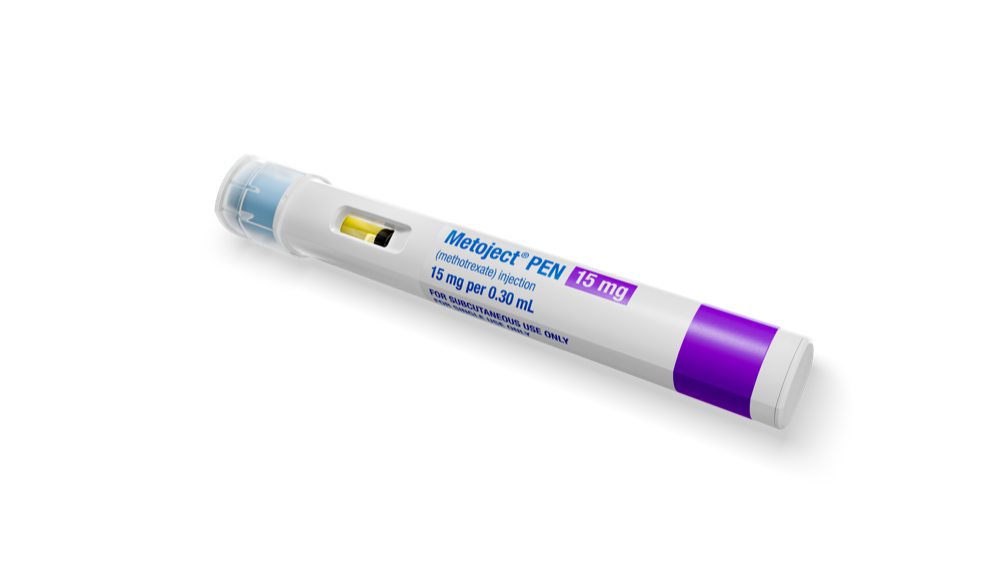This webpage is intended for UK patients who have been prescribed Metoject® PEN (methotrexate). If you are not, please click here.
The first injection of subcutaneous methotrexate PEN should be performed under direct medical supervision. However, your doctor may decide that you can learn how to inject subcutaneous methotrexate PEN yourself. You will receive appropriate training for you to do this. Metoject® PEN is injected once weekly.
Metoject® PEN (methotrexate) For Rheumatology
Metoject® PEN is indicated for the treatment of:
- active rheumatoid arthritis in adult patients,
- polyarthritic forms of severe, active juvenile idiopathic arthritis, when the response to nonsteroidal anti-inflammatory drugs (NSAIDs) has been inadequate,
- moderate to severe psoriasis in adult patients who are candidates for systemic therapy, and severe psoriatic arthritis in adults,
- mild to moderate Crohn’s disease either alone or in combination with corticosteroids in adult patients refractory or intolerant to thiopurines1


Methotrexate in Rheumatology
Our Consultation3
Address your main concerns at the start of your consultation.
Recent survey findings have shown that only 45% of patients had been able to voice their concerns about their treatment options. It is important to speak up and address any thoughts or concerns you may have, because if you don’t tell your healthcare professional, they won’t know what your personal needs or preferences are. The more information they know the better, and this can be used to make a decision with you, rather than for you.
Share details of your symptoms, prioritising those that have the most impact on your quality of life.
Symptoms can have a major impact on your quality of life. With 66% of patients struggling with their mental health, sharing details of your symptoms with your healthcare team will help them to understand you needs, and might help to shape their treatment recommendation. It is advised that you prepare for your consultation by noting down answers to questions that your healthcare professional might ask every time they see you. By having the answers ready, this leaves more time to discuss your concerns and priorities, which you can also write down in a list.
Know everything about your prescribed treatment.
Only 35% of patients surveyed left their first consultation feeling as though they’d received enough information about the proposed treatment from their consultant. Importantly, people who had lots of information responded better to their first treatment. It is important that you know as much as possible about your proposed treatment, including benefits, possible side effects and the time it takes to work.
It is encouraged that you contact your healthcare team early if you are experiencing any issues, as there are different things that they can suggest to help.
As medications are intended to use long term, it’s important to address issues promptly and find the therapy that suits you, rather than persevering with feeling unwell or simply stopping the medication.
The more you know about your options before you start the treatment, the better prepared you will be to manage any problems that may occur.
The ASK Approach will enable you to make the best decision possible about your treatment.
Please visit the National Rheumatoid Arthritis Society’s webpage at nras.org.uk for more rheumatoid arthritis specific information and support
Reporting of Side Effects
If you get any side effects, talk to your healthcare professional. This includes any possible side effects not listed in the Patient Information Leaflet contained within your subcutaneous methotrexate PEN carton.
You can also report side effects directly via the Yellow Card Scheme at yellowcard.mhra.gov.uk.
By reporting side effects, you can help provide more information on the safety of this medicine.
Further Information & Questions
Visit our contact page to submit an enquiryReferences:
- Metoject® Summary of Product Characteristics. [online] Available at: https://www.medicines.org.uk/emc/search?q=metoject#gref/. Last Accessed July 2025
- Common Questions about Methotrexate. NHS.uk. [online] Available at: www.nhs.uk/medicines/methotrexate/common-questions-about-methotrexate/. Last Accessed July 2025.
- How to Approach Your Rheumatology Consultation. [online] Available at: https://nras.org.uk/resource/how-to-approach-your-rheumatology-consultation/. Last Accessed July 2025.